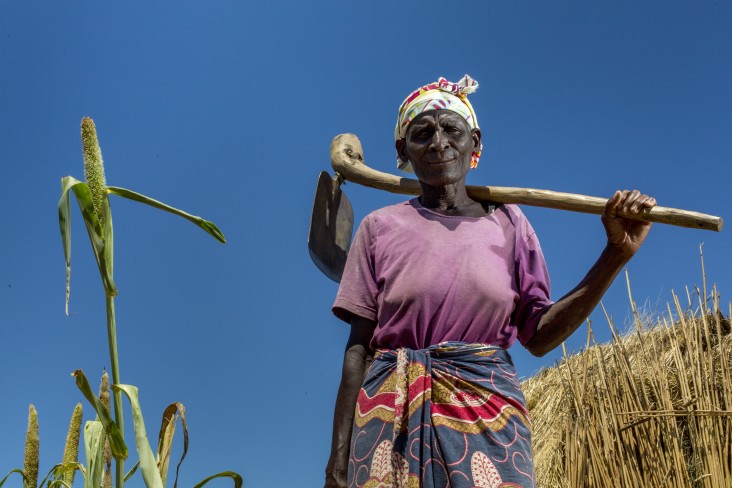Speeches Shim

Background
Smallholder farmers cultivate 90% of the arable land in Malawi and face many challenges including declining soil fertility, erratic rainfall, land constraints, and poor institutional support. With limited access to credit, inputs, and price information, the typical farmer struggles to support a family of six on only one hectare of land. Also, Malnutrition particularly is a major problem causing stunting for 47% of children under the age of 5. Therefore, agriculture, nutrition, and climate-resilient growth are top development priorities for USAID. Through partnerships with the Government of Malawi, local and international non-governmental organizations, and the private sector, USAID is spearheading innovative programs to strengthen smallholder farmers’ economic and climatic resiliency.
Program Elements
Agriculture
USAID/Malawi’s Feed the Future activities strengthen the competitiveness of the soy, groundnut, and orange-fleshed sweet potato value chains, improves the nutritional status of women and children, and builds the capacity of Malawian agriculture and nutrition organizations. The agricultural activities promote the use of improved farming practices and technologies, including seed varieties which are drought tolerant, disease resistant, and early maturing; and, climate smart agriculture to improve soil fertility, yields, and ultimately increase household incomes, making farmers more resilient to external shocks.
Nutrition
The Feed the Future and Food for Peace activities support community-level nutrition interventions to improve community capacity to prevent and reduce under-nutrition. The activities include promotion of optimal breastfeeding, complementary feeding, growth monitoring, food preparation and utilization, and hygiene and sanitation implemented through the care group model. These activities are directed to households with pregnant and lactating women and children under age five, with an emphasis on children under two.
Environment
In Malawi, there is rapid deforestation, overfishing, widespread soil erosion and degradation from unsustainable agricultural practices, and overexploitation and illegal trafficking of wildlife. All these environmental challenges are exacerbated by an unsustainably high population growth and vulnerability to the impacts (e.g., drought, unpredictable rain cycles, falling water tables, etc.) of climate change. USAID’s environment activities strengthen the resilience of vulnerable populations by addressing the main drivers of deforestation and overfishing, improving land and water management, and improving the capacity of local communities to manage their natural resource base.
Humanitarian Response
USAID provides support to the Government of Malawi to respond to the humanitarian needs that occur due to the food insecurity situation resulting from the recurrent adverse weather conditions. USAID channels its resources through the World Food Program (WFP) for the procurement of emergency relief commodities, including maize, beans, corn-soya blend, sorghum and related logistics support. Going beyond emergency, USAID supports the development activities to improve food security for vulnerable households in Southern Malawi districts. The UBALE and NJIRA activities began in 2015 and will work to address underlying causes of food insecurity until 2019.
Impact
- Supported the development of two critical policies: The National Charcoal Strategy and National Forest Landscape Restoration Strategy. Together these documents form the policy and analytical backbone of Malawi’s commitment to the African Forest Landscape Initiative (AFR 100) to restore 4.5 million hectares of forest and degraded landscapes by 2030.
- Trained a total of 2,695 people from government, civil society and the private sector to improve knowledge, systems, and policy on forest management and greenhouse gas accounting.
- Promoted tree planting, farmer managed natural regeneration, irrigation, vegetative propagation, riverbank rehabilitation, climate smart agriculture as well as use of improved fuel efficient cook stoves which, in turn, helped generate household-level economic benefits for more than 11,000 project beneficiaries.
- Helped to increase fisheries diversity from 39 species in 2016 to 49 in 2017 through the establishment of fish sanctuaries, habitat restoration, and reducing use of illegal fishing gear across 248,985 hectares of the four major freshwater ecosystems.
- Formed nearly 200 local fisheries management authorities and revamped the establishment of the Fisheries Association of Malawi, a grouping of commercial trawlers on Lake Malawi in readiness for the roll-out of a satellite based vessel monitoring system to combat illegal fishing in no-fishing zones.
- Soy: FTF supported 31,527 SHF to grow soy. Yields in the ZOI increased 30% over FY16 due to improved rainfall and adoption of double-row planting, leading to a 64% increase in production to 117,961 MT. FTF introduced locally manufactured soybean and groundnut inoculant which will significantly boost yields.
- Groundnuts: FTF supported 45,888 farmers to grow groundnuts. Yields in the ZOI increased 36% over FY16 due to improved rainfall and adoption of double-row planting, leading to a 52% increase in production to 212,905 MT. Researchers completed the second year of testing the aflatoxin biocontrol product Aflasafe, which will be presented to the GOM for approval in 2018. FTF will support the commercialization of Aflasafe and promote its use by SHF after approval.
- OFSP: FTF helped 28,431 households to grow OFSP. Vine multipliers in the ZOI produced 195,200 bundles of vines, which can be grown on 464 hectares. Continued marketing of OFSP-based food products (bread, crisps, and cookies) will boost demand for OFSP over the coming years.

Comment
Make a general inquiry or suggest an improvement.